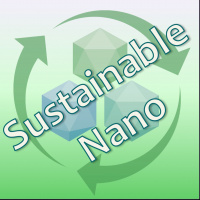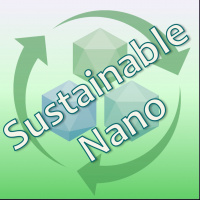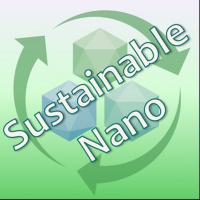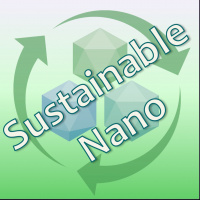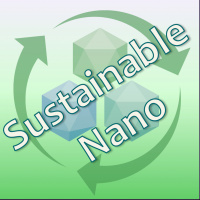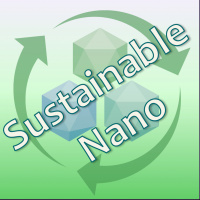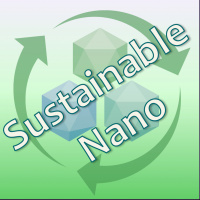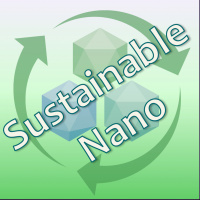Synopsis
Curious about nanotechnology, sustainability, and life in science? The Sustainable Nano podcast is produced by the Center for Sustainable Nanotechnology, a chemistry research center funded by the U.S. National Science Foundation.
Episodes
-
Ep 45. The World is Really Ready for Change
15/03/2024 Duration: 37minProfessor Mike Curry of the North Carolina Agricultural & Technological State University (NCAT) is a scientist, inventor, mentor, and advocate with a passion for bringing attention to the great research that happens at Historically Black Colleges & Universities (HBCUs). In this episode we share an interview between Dr. Curry and Dr. Bob Hamers, Director of the NSF Center for Sustainable Nanotechnology, discussing Dr. Curry's nanocellulose research and the process of bringing HBCUs and Primarily White Institutions (PWIs) together for meaningful collaboration.image shows Mike Curry (above) and Bob Hamers (below) during their Zoom call to record this interviewWant more podcast episodes? You can find them all on our podcast page, or you can subscribe through Apple Podcasts or Overcast, or listen on NSF's Science Zone Radio.ABOUT THIS EPISODERelated links:Mike Curry: CSN profile, LinkedInBob Hamers: CSN profile, Lab websiteAccounts of Chemical Research: Special Issue on Advancing Research at HBCUsNCAT Jo
-
Ep 44. Part of Something Bigger: Social Media, Mentoring, & Friendship with Stuart Cantrill
20/12/2023 Duration: 41minEarly in the COVID pandemic, then-graduate student Safia Jilani became Twitter buddies with the Chief Editor of the prestigious journal Nature Chemistry, Dr. Stuart Cantrill. Dr. Jilani is now a Postdoctoral Fellow with the NSF Center for Sustainable Nanotechnology, and Dr. Cantrill is now the Editorial Director for all of Nature's physics and chemistry journals... and they finally got the chance to meet in person last month! In this episode we bring you a conversation between these two chemists about the power and challenges of social media, the importance of mentorship, and being open to unforeseen career paths.image shows Stuart Cantrill (left) and Safia Jilani (right) enjoying ice cream in CambridgeWant more podcast episodes? You can find them all on our podcast page, or you can subscribe through Apple Podcasts or Stitcher, or listen on NSF's Science Zone Radio.ABOUT THIS EPISODERelated links:Stuart Cantrill: blog, BlueSkySafia Jilani: website, BlueSkyNature Chemistry: website, TwitterNature Nanotechnol
-
Ep 43. Revolutionizing How we Grow, Distribute, & Store Food: Revisiting the Connecticut Agricultural Experiment Station
07/11/2023 Duration: 42minFive years after our first interview, we catch up with Dr. Jason White about chemistry at the Connecticut Agricultural Experiment Station and how nanoscience can benefit agriculture and global food security. Graduate student Beza Tuga interviews Jason about his new role as Director of CAES and exciting research collaborations between CAES and the NSF Center for Sustainable Nanotechnology.image shows Beza Tuga (left) and the CSN team in Jason's office (L-R Jason White, Cheng-Hsin Huang, Wilanyi Alvarez Reyes, Beza Tuga, & Chaoyi Deng)Want more podcast episodes? You can find them all on our podcast page, or you can subscribe through Apple Podcasts or Stitcher, or listen on NSF's Science Zone Radio.ABOUT THIS EPISODERelated links:Jason White: websiteBeza Tuga: website, TwitterInterview from 2017: Ep 17. Putting Science to Work for Society: A Visit to the Connecticut Agricultural Experiment StationPodcast episode with Dr. Wade Elmer: Ep 25. Finding the Next Fix for the World's Problems: More from the Connec
-
Ep 42. Why We All Feel So Terrible And What to Do About It
03/07/2023 Duration: 43minMental Health Awareness Month was back in May, but it's never too late to talk about mental health and strategies for taking care of ourselves during difficult times. In this episode we share a discussion with psychiatrist Dr. Kaz Nelson called "Why we all feel so terrible and what to do about it."image shows a profile photo of Dr. NelsonWant more podcast episodes? You can find them all on our podcast page, or you can subscribe through Apple Podcasts or Stitcher, or listen on NSF's Science Zone Radio.ABOUT THIS EPISODERelated links:Kaz Nelson: website, TwitterThe Mind Deconstructed PodcastThe Blackfoot Wisdom that Inspired Maslow's HierarchyThe Center for Sustainable NanotechnologyInterviewee: Kaz NelsonProducer/Host: Miriam KrauseEditor: Jack RahillMusic: PC III and Dexter Britainfigure by by Nathalie Martinek with Khurram Jahangir. Model originally adapted by Eva Migdal This material is based upon work supported by the National Science Foundation under the Center for Sustainable Nanotechnology, grant num
-
Season 6 Trailer
27/06/2023 Duration: 02minWe've got a great set of episodes for Season 6 following our themes of Nanotechnology, Sustainability, and Life in Science. Interviews include the founders of @BlackinNanotech, Dr. Olivia Geneus and Jarriaun Streets; materials scientist Dr. Suveen Mathaudhu; and psychiatrist Dr. Kaz Nelson, plus others! Subscribe now so you won't miss an episode.
-
Ep 41. Stronger, Tougher, Lighter
08/03/2023 Duration: 27minWhat do nanotechnology, blacksmithing, and Star Wars have in common? In this episode, we talk with Dr. Suveen Mathaudhu about a range of topics from medical applications of materials science to metallurgy in The Mandalorian.Zoom screen shot of Dr. Mathaudhu showing off his Armorer action figure (complete with her blacksmithing tools)Want more podcast episodes? You can find them all on our podcast page, or you can subscribe through Apple Podcasts or Stitcher, or listen on NSF's Science Zone Radio.ABOUT THIS EPISODERelated links:Suveen Mathaudhu: website, TwitterThis is the Way: Tracing the Path between Damascus Steel and Beskar by Suveen N. Mathaudhu, Eric M. Taleff, & Jeffrey Wadsworth. 2022, JOM 74, 4466-4478Scale of Scientific MonstersPodcast episode: Ep 4. Nano Superheros: At the Interface of Art and ScienceThe Center for Sustainable NanotechnologyInterviewee: Suveen MathaudhuProducer/Host: Miriam KrauseEditor: Jack RahillMusic: PC III and Dexter BritainThis material is based upon work supported by th
-
Ep 40. This Is the Future
22/10/2021 Duration: 28minIt's the first episode of season 6! Come for the nanopharmacology, stay for the robotics and fun with Twitter networking. In this episode, we interview Olivia Geneus and Jarriaun Streets about founding #BlackinNanotech, how they got into science, and the challenges of communicating about nanotechnology.Black in Nanotech founders Olivia Geneus (left) and Jarriaun Streets (right), along with the #BlackInNano logoWant more podcast episodes? You can find them all on our podcast page, or you can subscribe through Apple Podcasts or Stitcher, or listen on NSF's Science Zone Radio.ABOUT THIS EPISODERelated links:Olivia Geneus: LinkedIn, Twitter, Physics World profileJarriaun Streets: LinkedIn, The Science Talk video interviewBeza Tuga: website, TwitterBlack in Nanotech: website, Twitter,InstagramEMOHAITI: website, InstagramHopital Bernard Mevs & Project Medishare Haiti Relief: GoFundMeBlack in Chemistry: website, Twitter, InstagramBlack in X: website,The Center for Sustainable NanotechnologyInterviewees: Jarriaun
-
Ep 39. Retelling a Story Through Illustrations: Lifeology Part 2
12/01/2021 Duration: 51minHow do you explain sustainable nanotechnology using art? Last fall the Center for Sustainable Nanotechnology collaborated with Lifeology, an online platform that connects scientists and artists, to create a public-friendly "mini-course" called "What happens to nanoparticles in the environment?". On this episode of the podcast, CSN graduate students and course co-authors Stephanie Mitchell and Paige Kinsley talk with artist Elfy Chiang about her journey as an artist, working with scientists, and the excitement that can happen when collaborators surprise each other.Artist Elfy Chiang (top left) and interviewers Paige Kinsley (top right) and Stephanie Mitchell (bottom) along with two examples of Elfy's artwork from "What happens to nanoparticles in the environment?" Want more podcast episodes? You can find them all on our podcast page, or you can subscribe through Apple Podcasts or Stitcher, or listen on NSF's Science Zone Radio.ABOUT THIS EPISODECartoon nanoparticle from the Center for Sustainable Nanotechnolog
-
Ep 38. Beyond Jargon to Empathy: Lifeology Part 1
28/12/2020 Duration: 42minHow do you explain sustainable nanotechnology in text shorter than a tweet? This fall the Center for Sustainable Nanotechnology collaborated with Lifeology, an online platform that connects scientists and artists, to create a public-friendly "mini-course" called "What happens to nanoparticles in the environment?". On this episode of the podcast, CSN graduate students and course co-authors Jaya Borgatta and Stephanie Mitchell talk with Lifeology co-founder Paige Jarreau about Lifeology, her journey to becoming a professional science communicator, and the importance of empathy in achieving accessible communication.Paige Jarreau is the co-founder of Lifeology)Want more podcast episodes? You can find them all on our podcast page, or you can subscribe through Apple Podcasts or Stitcher, or listen on NSF's Science Zone Radio.ABOUT THIS EPISODECartoon nanoparticle from the Center for Sustainable Nanotechnology's Lifeology course, "What happens to nanoparticles in the environment?" (image by Elfy Chiang)Related links
-
Ep 37. Shine Bright like a Diamond... Inside of a Worm
06/10/2020 Duration: 17minZach Jones, a graduate student in the Center for Sustainable Nanotechnology, gives diamonds to his study organism. But they're nanodiamonds, not jewelry, and after the tiny worms eat them, Zack uses their fluorescent and magnetic properties to see where the material accumulates within the worm's body. This episode talks about worms, defective diamonds, and how the combination of the two can provide information on environmental contamination.Zack Jones (left) and Paige Kinsley (right) recording this episode's interview (photos courtesy of Zack Jones and Paige Kinsley)Want more podcast episodes? You can find them all on our podcast page, or you can subscribe through Apple Podcasts or Stitcher, or listen on NSF's Science Zone Radio.ABOUT THIS EPISODEDiagram of a nanodiamond molecule showing a nitrogen vacancy center defect (missing nitrogen atom) in the middle (image by Zack Jones)Related links:Paige Kinsley: website, TwitterZack Jones: website, Twitter2020 MacArthur Fellows;NK Jemisin; The Fifth SeasonPaul Daue
-
Ep 36. "Yes, and...": A Guide to Effective Science Communication Using Improvisation
20/08/2020 Duration: 40minScience communication takes a lot of different forms, including improvisation. In this episode, we interview Center for Sustainable Nanotechnology graduate student Paige Kinsley and alum Liz Laudadio. The episode dives deep into the life skills you can learn from doing improv, how it can make you a better listener, and how it relates to science storytelling. Not to mention the benefits of finding hobbies to do with your labmates.(Paige Kinsley (left) and Liz Laudadio (right), mid-improv performance and recording this episode's interview, along with Blue the cat. (photos courtesy of Liz Laudadio & Paige Kinsley)Want more podcast episodes? You can find them all on our podcast page, or you can subscribe through Apple Podcasts or Stitcher, or listen on NSF's Science Zone Radio. ABOUT THIS EPISODERelated links:Liz Laudadio: website, TwitterPaige Kinsley: website, TwitterAtlas Theater CompanyMinh Tam Hoang's blog post: coming soon!Article about summer undergraduate programs: COVID-19 shakes up summer internship
-
Ep. 35 Photographing the Unphotographable
08/05/2020 Duration: 37minHow do you photograph the unphotographable? In this episode we interview MIT research scientist Felice Frankel, who specializes in visualizing science, using pictures to draw audiences in and help scientists more deeply examine their own work, including nanoscale materials that are smaller than wavelengths of light! We also have a mini-interview with graduate student Paige Kinsley about how COVID-19 is affecting chemistry labs in the Center for Sustainable Nanotechnology.(photos by Miriam Krause)Want more podcast episodes? You can find them all on our podcast page, or you can subscribe through Apple Podcasts or Stitcher.ABOUT THIS EPISODERelated links:Felice FrankelBooks: Modern Landscape Architecture, Picturing Science & Engineering, No Small MatterStephen J. Gould; E.O. Wilson; George Whitesides; Don EiglerSustainable Nano blog posts: Ferrofluid, gold color & surface plasmon resonanceThe Center for Sustainable NanotechnologyInterviewees: Felice Frankel & Paige KinsleyInterviewer: Stephanie Mitch
-
Ep. 34 Winter Holiday Mini-Episode: Colorful Carbon Dots
20/12/2019 Duration: 08minWinter can get pretty dark, especially in northern latitudes, and many cultures have winter holidays that feature and celebrate lights. For our last episode of 2019 we decided to talk about the bright and colorful chemistry of carbon dots! In this mini episode we interview Dr. Christy Haynes, Professor of Chemistry at the University of Minnesota and Associate Director of the Center for Sustainable Nanotechnology.Left: Dr. Christy Haynes. Right: Transmission electron microscopy (TEM) image of malic acid carbon dots with an inset photo of the carbon dots in aqueous solution and illuminated by 365 nm UV (carbon dot image by Bo Zhi)Want more podcast episodes? You can find them all on our podcast page, or you can subscribe through Apple Podcasts or Stitcher.ABOUT THIS EPISODERelated links:Christy Haynes: website, TwitterSustainable Nano blog post: Have you ever seen colorful "carbon"?Pham, S. et al. Carbon Dots: A Modular Activity To Teach Fluorescence and Nanotechnology at Multiple Levels. Journal of Chemical Edu
-
Ep. 33 It Just Didn't Feel Like Me: Belonging and Sexism in Science
26/11/2019 Duration: 48minHow often do college women in STEM (science, technology, engineering, and math) experience sexism? And how do these experiences affect their likelihood of staying in scientific fields? In this episode we talk with Majel Baker, a counseling psychologist who investigated these questions in her doctoral dissertation. Spoiler alert: sexism is bad. But there are ways we can work to improve the situation. Plus, we have a mini-interview about what this year's chemistry Nobel prize had to do with sustainable nanotechnology.(photo courtesy of Majel Baker)Want more podcast episodes? You can find them all on our podcast page, or you can subscribe through Apple Podcasts or Stitcher.ABOUT THIS EPISODERelated links:Majel Baker: website, Twitterarticles coming soon (links will be added when available): Daily Sexism Experienced by Women in STEM Majors; The power of peers: Correlates of classroom climate in undergraduate women in STEMNatalie Hudson-Smith: website, TwitterNational Academies Report: Sexual Harassment of Women:
-
Ep 32. An Electronic Circuit on Every Seed?
30/10/2019 Duration: 36minWhat if every seed you planted could include a sensor to monitor moisture and nutrients? What if every tissue had nanoscale electronics to check for viruses when you blew your nose? Our fourth season launches with an interview about the future of nanotransistor technology with Professor Mike Filler from Georgia Tech. We also begin our new series of timely mini-interviews with a quick conversation about "necrochemistry" in honor of Halloween.Prof. Michael Filler (left, photo courtesy of Dr. Filler) and his Nanovation PodcastWant more podcast episodes? You can find them all on our podcast page, or you can subscribe through Apple Podcasts or Stitcher.#### **ABOUT THIS EPISODE**Related links:Prof. Mike Filler: website, TwitterNanovation PodcastMoore's LawMoore’s Law Is Dead. Now What? by Tim Simonite in MIT Technology Review, 2016.Prof. Kira BartonProf. Bob Hamers (Center for Sustainable Nanotechnology Director)Natalie Hudson-Smith: website, TwitterAsk A Mortician YouTube ChannelThe Order of the Good DeathThe Cen
-
Season 4 Preview
29/10/2019 Duration: 01minWe've got a great lineup of episodes taking shape for this year on our themes of Nanotechnology, Sustainability, and Life in Science. Interviews include Prof. Mike Filler talking about nanowires and his podcast Nanovation, Majel Baker discussing the effects of sexism in science, Felice Frankel talking about visual communication for nanoscience, and that's only the beginning. Subscribe now so you don't miss an episode!
-
Ep 31. Jumping Asteroid Clouds: Supporting Vulnerable Learners in Educational Achievement
22/03/2019 Duration: 48minLast November, Dr. Cat Hicks wrote an essay on Medium called "Reading vulnerable learners' applications to grad school: we need to stop failing them." In this episode of the podcast, University of Minnesota graduate student Becky Rodriguez interviews Dr. Hicks about her essay, her educational and career path, and how our educational system can be stacked against vulnerable learners. She offers some advice for applicants, those who review applications, and others who may just want to help. "A truly inclusive and diverse future will produce way better work, and you only get there by saying, 'we have to be comfortable with letting people be different.'" Our conversation is especially relevant given recent news and discussion about unfairness and fraud in U.S. college admissions. (And if you want to know what any of this has to do with asteroid fields, you'll just have to listen to the episode.) Dr. Cat Hicks (left, photo courtesy of Dr. Hicks) and a tweet about her Medium essay on helping st
-
Ep 30. Nanocomposites: Getting the Best of Two Worlds
22/02/2019 Duration: 25minWhat could be cooler than a technology that uses nanomaterials? How about one that combines two nanomaterials! Nanocomposites bring together two or more nanoscale materials to take advantage of their combined features to get what Dr. Klaus Müllen calls "the best out of two worlds." Dr. Müllen is an emeritus director at the Max Planck Institute for Polymer Research, where his work ranges from the chemistry and physics of small molecules to nanocomposites and biosynthetic hybrids. In this interview he talks about how a fascination with color got him into chemistry, some of the many technological applications for nanocomposites, and some candid advice for young scientists. (L-R) Stephanie Mitchell, Dr. Klaus Müllen, and Andrew Northwick after their interview Want more podcast episodes? You can find them all on our podcast page, or you can subscribe through Apple Podcasts or Stitcher. #### **ABOUT THIS EPISODE** Related links: Klaus Müllen AAAS and 2019 Annual Meeting AAAS Communicating Science Semin
-
Ep 29. Green is the Color of Chemistry
09/01/2019 Duration: 21minDr. Mary Kirchhoff is Executive Vice President of Scientific Advancement at the American Chemical Society and Director of the ACS Green Chemistry Institute. Her career has spanned a variety of experiences related to sustainability in chemistry, including working with the U.S. Environmental Protection Agency's green chemistry program and co-editing a book on Greener Approaches to Undergraduate Chemistry Experiments. In this episode, Dr. Kirchhoff shares insights and examples on the importance of green chemistry with two graduate student interviewers from the Center for Sustainable Nanotechnology. Dr. Mary Kirchhoff, Executive Vice President of Scientific Advancement at ACS (left); green chemistry image by IO-images Want more podcast episodes? You can find them all on our podcast page, or you can subscribe through Apple Podcasts or Stitcher. #### **ABOUT THIS EPISODE** Related links: Mary Kirchhoff The Chemistry is Always Greener... by Mary Kirchhoff, 2011 ACS Green Chemistry Institute Environmental Protect
-
Ep 28. Who's Not In the Room and Why Not? Inclusivity and Bias Across Class Backgrounds in College Education
30/11/2018 Duration: 32minAlvin Chang, Senior Graphics Reporter for Vox, wrote and illustrated an article last year called "The subtle ways colleges discriminate against poor students, explained with a cartoon." In this episode of the podcast, we share the audio of a webinar that Chang presented for the Center for Sustainable Nanotechnology about his work. He tackles challenging issues of class, bias, and educational attainment using clear illustrations (verbal as well as visual) and simple analogies that are relevant far beyond the world of academic science. Alvin Chang, Senior Graphics Reporter for Vox (left, courtesy of Alvin Chang) and one of his illustrations for "The subtle ways colleges discriminate against poor students, explained with a cartoon" (right, used with permission from Vox.com) Want more podcast episodes? You can find them all on our podcast page, or you can subscribe through Apple Podcasts or Stitcher. #### **ABOUT THIS EPISODE** Related links: Alvin Chang: website, Twitter The subtle ways co


